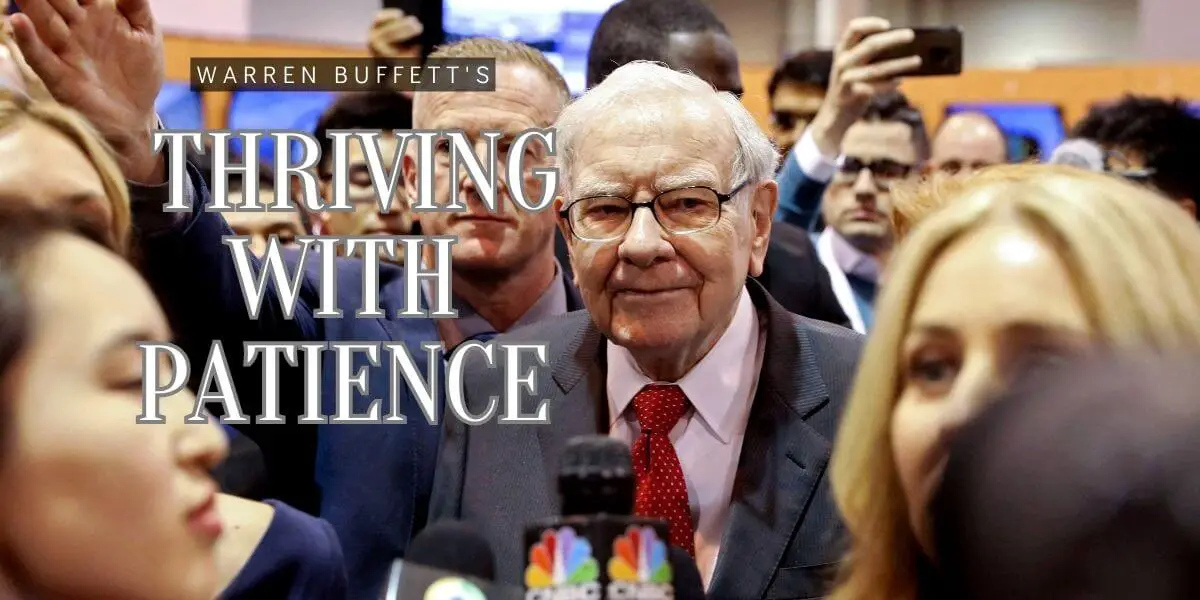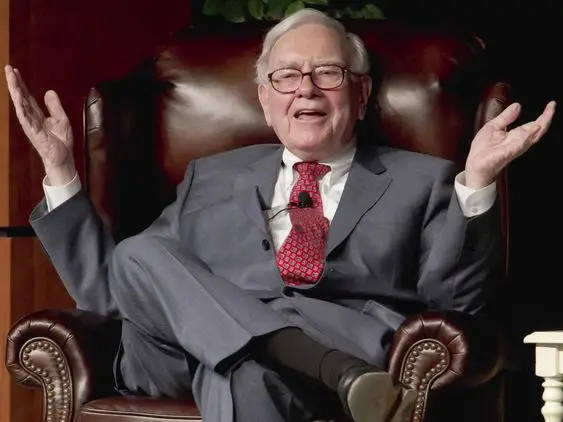
Warren Buffet - Investing With Patience
Are you ready to unlock the secrets of successful investing? In this article, we delve into the world of Warren Buffet, the legendary investor known for his patience and long-term approach.
Discover the power of investing with patience as we examine Buffet's investment philosophy and his key strategies.
Learn valuable lessons from his patient approach that can help you achieve mastery in the world of investing. Get ready to take your investment game to the next level with Warren Buffet as your guide.
Key Takeaways
- Long-term investing can greatly benefit your financial future.
- Warren Buffet advocates for buying and holding quality stocks for the long haul.
- Patient investors have the opportunity for higher returns and reduced risk.
- Buffet's favorite holding period is forever.
The Power of Long-Term Investing
You'll be amazed at the power of long-term investing and how it can greatly benefit your financial future. One of the most prominent advocates of long-term investing is Warren Buffet, the legendary investor and one of the wealthiest individuals in the world.
Buffet's investment strategy is based on the principle of buying and holding quality stocks for the long haul rather than engaging in frequent buying and selling. This approach has yielded remarkable results over the years.
One of the key benefits of long-term investing is the potential for significant capital appreciation. Holding onto investments for extended periods allows them to grow and compound over time. This can lead to substantial wealth accumulation and financial security in the long run.
Warren Buffet himself has demonstrated the power of this strategy, achieving astounding returns on his investments through patient and disciplined investing.
Long-term investing also offers the advantage of reduced transaction costs. Frequent buying and selling of stocks can incur hefty fees and taxes, eroding your overall returns. Adopting a long-term approach minimizes these costs and maximizes your gains.
Furthermore, long-term investing allows you to take advantage of the power of compounding. Reinvesting dividends and earnings into your investments can increase your wealth over time. This compounding effect can significantly boost your portfolio value and generate substantial returns.

The Early Years of Warren Buffett
Warren Buffett, widely regarded as one of the most successful investors in history, had humble beginnings that laid the foundation for his remarkable journey in the world of finance. Born on August 30, 1930, in Omaha, Nebraska, Buffett displayed an early aptitude for business and investing.
During his childhood, Buffett showed an entrepreneurial spirit by engaging in various money-making ventures. He famously sold chewing gum, Coca-Cola, and magazines door-to-door, showcasing his knack for identifying profitable opportunities even at a young age. This early exposure to business and his natural affinity for numbers foreshadowed his future success as an investor.
Buffett's interest in the stock market was ignited during his teenage years. He began investing in stocks and even filed his first tax return at the age of 14, claiming deductions for his bicycle and watch as tools of his trade.
He found inspiration in Benjamin Graham's book "The Intelligent Investor," which laid the groundwork for his value investing philosophy. This philosophy emphasized the importance of buying undervalued stocks and holding them for the long term.
After completing his studies at the University of Pennsylvania and Columbia University, Buffett worked briefly on Wall Street before returning to Omaha. He started a partnership with friends and family, where he managed their investments using his value investing principles. Over time, his approach yielded impressive returns, further solidifying his reputation as a shrewd investor.
One of Buffett's most significant turning points came when he acquired Berkshire Hathaway, a struggling textile manufacturing company, in 1965. Although his initial intention was to turn the company around, he eventually shifted his focus to investing in other businesses. This decision marked the transition from his early investment in individual stocks to his later strategy of acquiring entire companies.
Buffett's early years were marked by an unwavering commitment to patience and discipline in investing. He was known for weathering market fluctuations without succumbing to emotional decision-making. This resilience and long-term perspective would become hallmarks of his investment philosophy.
Warren Buffet's Investment Philosophy
His philosophy involves taking a long-term approach to the market. Warren Buffet, often referred to as the 'Oracle of Omaha,' is one of the most successful investors of our time. His investment philosophy centers around value investing and the power of compounding returns.
Buffet looks for companies that are undervalued by the market, meaning their stock price does not accurately reflect their true worth. He believes that investors can reap the benefits of compounding returns by investing in these undervalued companies and holding onto them long-term.
Value investing is the practice of buying stocks that are trading below their intrinsic value. Buffet focuses on companies with strong fundamentals, such as a solid balance sheet, consistent earnings growth, and a competitive advantage in their industry.
Buffet's emphasis on the long term is rooted in the power of compounding returns. Compounding is the process of earning returns on both the initial investment and the previous returns generated.
Patience: The Key to Warren Buffet's Success
To achieve success in the market, it's important to maintain a patient approach like Warren Buffet's. Buffet's success as an investor can be attributed to his unwavering patience in-stock selection. Here are some key benefits of patient investing:
- Higher Returns: Patient investors like Buffet understand that the market is volatile and unpredictable in the short term. They can ride out market fluctuations and benefit from compounding returns by staying invested long.
- Lower Risk: Patient investors are less likely to make impulsive decisions based on short-term market trends or emotions. Instead, they focus on the fundamentals of a company and its long-term prospects, reducing the risk of making poor investment choices.
Warren Buffet's patience in-stock selection is legendary. He famously said, 'The stock market is a device for transferring money from the impatient to the patient.' Buffet's approach involves thoroughly researching a company, understanding its competitive advantage, and waiting for the right investment opportunity. He believes in buying quality stocks at reasonable prices and holding them long-term, regardless of short-term market fluctuations.

Strategies for Patient Investing
One strategy for maintaining a patient approach in the market is to focus on long-term prospects rather than short-term fluctuations. By identifying companies with strong fundamentals and competitive advantages, you can withstand temporary market volatility and benefit from the potential growth over time.
Another key aspect of patient investing is effective risk management. This involves carefully analyzing and evaluating the potential risks associated with each investment and taking appropriate measures to mitigate them.
Diversification strategies are crucial in risk management by spreading your investments across different asset classes, industries, and geographies. This helps to reduce the impact of any individual investment's performance on your overall portfolio.
To illustrate the importance of risk management and diversification, consider the following table:
Risk Management
Diversification Strategies
Conduct thorough research on potential investments
Spread investments across different asset classes
Set clear investment goals and stick to them
Invest in a variety of industries
Regularly review and adjust your portfolio
Consider international opportunities
Utilize risk management tools such as stop-loss orders
Allocate investments based on risk tolerance
The Berkshire Hathaway Era
The Berkshire Hathaway era stands as a defining chapter in Warren Buffett's legendary investment career. After acquiring the struggling textile company in 1965, Buffett transformed Berkshire Hathaway into a conglomerate that would become the cornerstone of his investment philosophy and a testament to his unparalleled patience and strategic insight.
Recognizing the textile industry's challenges, Buffett transitioned Berkshire Hathaway's focus towards investments in other businesses. This marked a pivotal shift from his earlier emphasis on stock market investments. His systematic approach of acquiring companies with strong fundamentals and competitive advantages reflected his commitment to long-term value creation.
A key factor in Buffett's Berkshire Hathaway strategy was his emphasis on retaining earnings and reinvesting them intelligently. This reinvestment allowed the conglomerate to grow its intrinsic value over time steadily. By reinvesting in businesses he believed in, Buffett showcased his belief in the power of compounding returns and demonstrated his patience in waiting for substantial gains.
One of the most iconic elements of Buffett's Berkshire Hathaway era is his annual shareholder letters. These letters serve as a masterclass in investment wisdom, offering insights into his thought process, successes, and even failures. Through these letters, he has consistently emphasized the importance of understanding the businesses one invests in, the significance of a strong economic moat, and the virtue of holding investments for the long term.
Buffett's disciplined approach to acquisitions and his dedication to ethical business practices significantly shaped Berkshire Hathaway's reputation as a responsible and reliable conglomerate. This reputation, in turn, attracted partners, acquisitions, and investors who shared his patient and value-driven approach.
The Modern Investment Landscape
Warren Buffett's enduring wisdom on investing with patience remains relevant in the modern investment landscape. While the world of finance has evolved since his early years, the core principles he espouses remain valuable guides for investors seeking sustainable success.
In today's fast-paced and technologically driven world, the temptation to chase quick profits and follow short-term trends can be overwhelming. However, Buffett's emphasis on patience is a timely reminder that true wealth is built over time. The rapid fluctuations in stock prices driven by market sentiment underscore the importance of maintaining a long-term perspective and not being swayed by momentary market noise.
The rise of new investment vehicles, such as cryptocurrencies and alternative assets, adds complexity to the modern investment landscape. Yet, Buffett's emphasis on understanding the investments one makes remains pertinent.
He advises against investing in assets one doesn't fully comprehend, regardless of the current hype surrounding them. This cautious approach can help investors avoid pitfalls and make informed decisions.
Moreover, the interconnectedness of global markets has made it easier for investors to diversify their portfolios internationally. Buffett's acknowledgment of the importance of diversification aligns with this modern trend.
However, he emphasizes that diversification should not dilute the investor's focus or lead to overextension. Instead, a well-diversified portfolio should be built on strong, well-researched investments.
Buffett's call for transparency and ethical business practices also resonates strongly in the modern context. With increased access to information, investors are better equipped to scrutinize companies' actions and values. This demand for transparency aligns with Buffett's philosophy and encourages companies to uphold higher standards.
Finally, the availability of information and investment platforms has empowered individual investors like never before. While technological advancements have democratized investing, Buffett's advice to approach investments with the diligence of owning a business remains vital. The ease of trading should not overshadow the importance of thoroughly understanding the companies behind the stocks.

Lessons From Warren Buffet's Patient Approach
By adopting a patient approach in the market, you can learn valuable lessons from Warren Buffet's strategies for long-term success. Warren Buffet, widely regarded as one of the greatest investors of all time, has consistently emphasized the importance of patience in investing. Here are some key lessons you can learn from his patient approach:
- Focus on the long-term: Buffet's investment strategy is centered around finding undervalued companies with strong fundamentals and holding onto them for the long haul. He believes that long-term thinking is crucial for achieving sustainable returns.
- Avoid market timing: Rather than trying to predict short-term market movements, Buffet advocates staying invested and ignoring the noise. He famously stated, 'Our favorite holding period is forever.' This approach helps you avoid costly mistakes associated with market timing.
- Embrace market downturns: Buffet sees market downturns as opportunities to buy quality stocks at discounted prices. Instead of panicking during a market crash, he advises investors to stay calm and take advantage of the situation.
Conclusion
Warren Buffet's success as an investor can be attributed to his patient approach and long-term investment philosophy.
By focusing on the fundamentals of companies and holding onto investments for extended periods, Buffet has achieved impressive returns consistently.
His strategies, such as value investing and finding undervalued stocks, have proven effective over time.
Lessons can be learned from Buffet's patient approach, reminding us that sometimes the greatest rewards come to those who wait in the fast-paced investing world.
https://lostnloveco.com/warren-buffet-investing-with-patience/